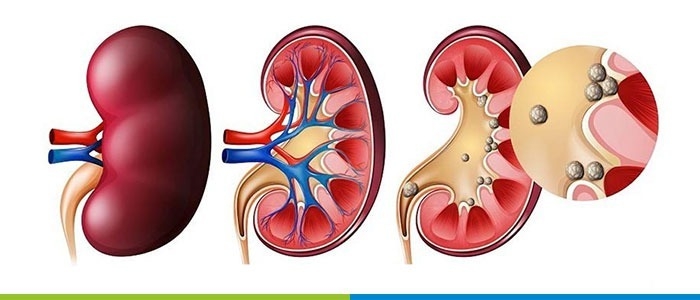Top 5 Causes of Kidney Stones in Young Adults and How to Prevent Them

Kidney stones are hard deposits made up of minerals that form in the kidneys. They can lead to intense pain and suffering, particularly for young people. To resolve this condition, one needs to know how these stones form, their symptoms, and what one can do to treat these stones.
Causes of Kidney Stones in Young Adults:
Here’s a breakdown of the top five causes of kidney stones in young adults and tips on how to prevent them:
Dehydration
Not drinking enough water is one of the most common causes of kidney stones. When you’re dehydrated, your urine becomes more concentrated, making kidney stones more likely to form. Young adults, especially those with busy lives or who continuously engage in intense exercises, sometimes forget to drink enough water.
Diet High in Oxalates
Foods high in oxalates contribute to kidney stone formation. Most foods, including spinach, beets, nuts, and chocolate, contain some oxalate. Eating excessive amounts of these foods may increase one’s chances of developing kidney stones. Teenagers indulging in trendy diets may unknowingly be increasing their intake through high-oxalate foods. Alcoholic & Non-Alcoholic Beverages
High Sodium Intake
A diet that contains high salt may increase calcium levels in urine, which can lead to the formation of calcium stones. Processed and fast foods are usually high in sodium, and many young adults consume such a diet. Labeling is essential, and people need to be careful about the sodium they take.
Obesity
Obesity is quickly becoming a significant problem among young people. Excess weight can cause an imbalance in the acid levels of urine, thus increasing the possibility of uric acid stones formation. Other health-related problems also tend to increase. Often, weight control is crucial to healthy living.
Endocrine disorders like primary hyperparathyroidism, thyroid disorders, Uncontrolled Diabetes with recurrent urinary tract infections and hyperuricemia.
Family History
If kidney stones run in your family, you might be at higher risk. If you have someone in your family who has a history of kidney stones, then you would likely increase your chances of having kidney stones. Knowing your family history will enable you to take adequate measures to avoid kidney stones.
Symptoms of Kidney Stones in Young Adults
Kidney stone symptoms need to be recognized and diagnosed as early as possible. Common symptoms of kidney stones in adults include:
- Severe Pain: These occur in the back, side, or lower abdomen. Pain tends to be intense and can come in waves.
- Changes in Urination: You may have an urgent need to urinate. They can hurt while urinating or accompany blood in your urine.
- Nausea and Vomiting: These symptoms can occur due to the pain or blockage caused by the stones.
- Cloudy or Foul-Smelling Urine: It can be an infection or another complication.
If you experience any symptoms or want to know more about how to keep your kidneys healthy, consult our specialists today! Early diagnosis usually prevents complications, and the pain can also be better managed.
Treatment Options for Kidney Stones in Adults
Treatment options for kidney stones depend on the size and type of the stones. Here are some common approaches:
- Drink Plenty of Water: Staying hydrated can help flush out smaller stones. Aim for at least 3 liters of water daily. To target 24 hr urine output of around 2.5 liters.
- Medication: Medication based on Dr. Consulation
- Surgery: In some cases, you may have to undergo surgery when the stones cause obstruction to the urinary tract.. The procedures include Lithotripsy, in which shock waves are applied to break the stones into several pieces that will be easy to pass.
- Dietary Changes: Solt restrictions 4 grams per day.
- Optimize calcium intake of 1000 to 1200 milligrams per day
- Restrict animal protein
- Other dietary precautions based on the nature of the stone disease
- Metabolic workup of stone disease for recurrent stone formers
Prevention of Kidney Stones in Young Adults
Preventing kidney stones is possible with some lifestyle changes. Here are a few tips to help you avoid kidney stones:
- Stay Hydrated: Drink plenty of liquids, specifically water. You must have up to 8-10 glasses of water a day. Water will help dilute your urine and stone formation.
- Maintain a Balanced Diet: Focus on a diet rich in fruits and vegetables. Limit foods high in oxalates and sodium. Choose whole grains and lean proteins to support overall health.
- Limit Animal Protein: Another risk factor for kidney stones from excessive intake of food is a high intake of animal protein. Balance meat, fish, and eggs with beans and lentils, which are plant-based proteins.
- Exercise Regularly: Regularly maintaining a healthy weight may help prevent kidney stones. Find time for at least 30 minutes of active exercise most days of the week.
Conclusion
Kidney stones in young adults are painful and disrupt their active lifestyle, but the cause of kidney stones in adults can be understood, and preventive measures can be taken accordingly. Proper treatment is possible if medical attention is sought at the time when symptoms arise. So, by being proactive about kidney health, young adults can reduce their chances of developing kidney stones and be fit and healthy once more.
This article has been medically reviewed by Dr Sandeep, Nephrologist

